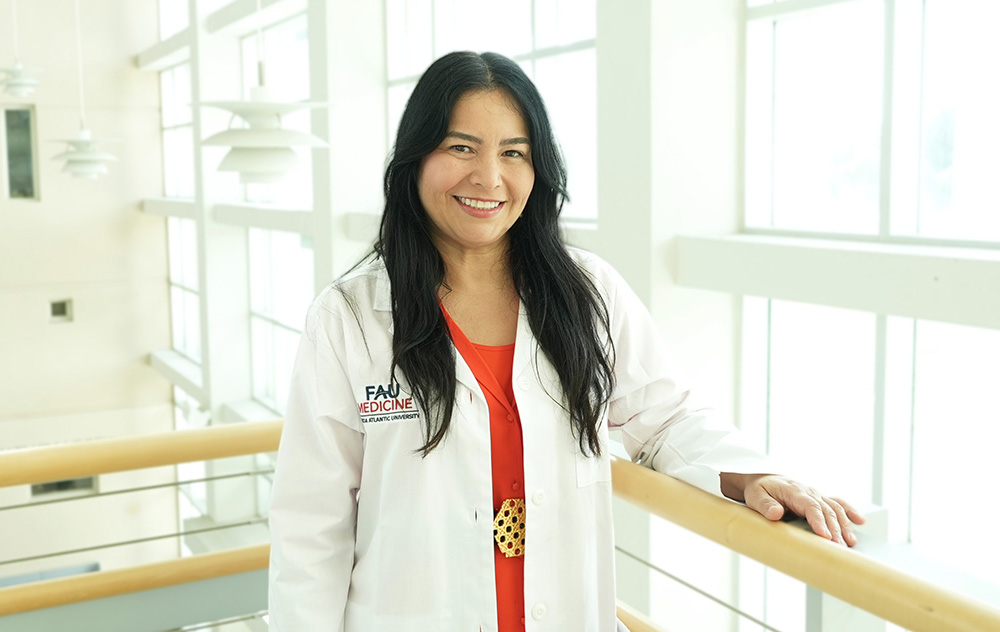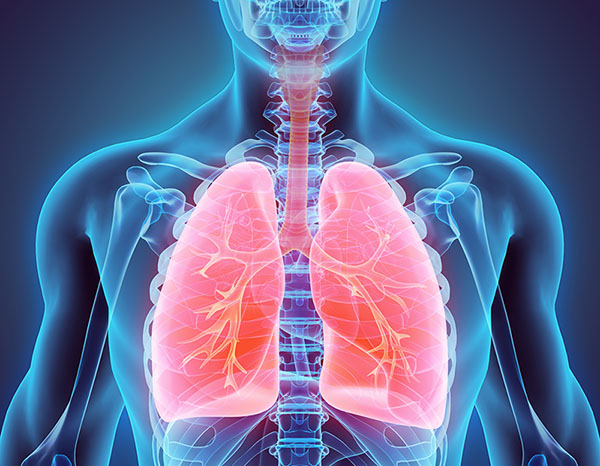Breathe Easy: Expert Tips for Maintaining Lung Health
 (Photo Credit: Julianna Cross, FAU Schmidt College of Medicine)
(Photo Credit: Julianna Cross, FAU Schmidt College of Medicine)
Your lungs power your life, yet they often go unnoticed until something goes wrong. Smoking and exposure to secondhand smoke remain the leading causes of preventable death in the United States, claiming over 480,000 lives each year. Meanwhile, vaping - a seemingly safer alternative - has surged, particularly among younger generations. According to the 2022 National Youth Tobacco Survey, more than 2.5 million high school students reported using e-cigarettes, a trend with serious implications for future lung health. As we observe Lung Cancer Awareness Month this November, it's a timely reminder to pause, reflect, and consider how we can better protect and preserve the health of our lungs, one breath at a time.
Dr. Maria Mejia, a lung health expert at Florida Atlantic's Schmidt College of Medicine, offers practical advice on protecting lung health, highlighting the risks associated with smoking and vaping, as well as lifestyle habits that support respiratory wellness.
Vaping vs. Smoking: Understanding the Risks
For years, we've known that smoking is deadly, causing serious conditions like cancer, chronic obstructive pulmonary disease (COPD), and coronary heart disease. But vaping, sometimes seen as a safer alternative, brings new health risks. Dr. Mejia explained that e-cigarettes, often marketed to young people, can lead to rapid nicotine dependence. "A single vaping pod can contain as much nicotine as a pack of cigarettes," she noted, explaining how addiction can become established faster than expected. This dependency not only increases the likelihood of smoking traditional cigarettes but may also elevate the risk of future addiction to other substances.
Recent studies by the Schmidt College of Medicine have tracked vaping patterns among teens, showing a threefold increase in daily use from 2015 to 2019. While pandemic restrictions saw a slight drop, numbers remain high, particularly among older teens, with young women leading in daily use rates. "It's essential to keep these trends in mind as we focus on prevention, especially as we are just beginning to see the long-term effects of vaping," Dr. Mejia emphasized.
Simple Steps for Stronger Lungs
Dr. Mejia shared several steps and lifestyle adjustments that can protect lung health at any age, regardless of whether you smoke or vape:
- Commit to Quitting: Whether you smoke traditional cigarettes or vape, quitting is the best choice for your lungs. It's not easy, but it's worth it. Combining behavioral therapy with nicotine replacement options - such as patches or gum - can increase the chances of success. "Even if you've tried before, keep going," Dr. Mejia encouraged. "Every attempt gets you closer to quitting for good."
- Exercise Regularly: Activities like walking, swimming, running, and cycling strengthen the respiratory system by increasing lung capacity and improving circulation. Even simple breathing exercises can boost lung strength and reduce stress.
- Eat for Your Lungs: What you eat can directly impact your respiratory health. A diet rich in antioxidants, found in berries, spinach, and nuts, can help reduce lung inflammation. Omega-3 fatty acids, found in fish like salmon, support lung function and reduce inflammation. Staying hydrated is equally crucial; water keeps airways moist and helps your lungs function smoothly.
- Optimize Indoor Air Quality: Air quality inside the home is often neglected but critical to respiratory health. Dust, mold, and even household chemicals can add up over time, irritating the lungs. Dr. Mejia recommended using an air purifier with a HEPA filter, ventilating the home frequently, and testing for radon - an odorless gas that's a leading cause of lung cancer among non-smokers.
The Latest in Lung Health Research at Schmidt College of Medicine
Research at the Schmidt College of Medicine spans a wide range of lung health topics, from lung cancer and treatment-resistant diseases to the specific impacts of smoking and vaping among adolescents and vulnerable populations. This research not only tracks trends but also examines the broader social factors driving smoking and vaping in certain communities. "Our goal is to address lung health holistically, considering how social and economic conditions influence these behaviors," Dr. Mejia shared. By analyzing these factors, the team at the college is working to inform public health policies that could transform the future of lung health.
In one recent study, researchers examined the rise of vaping among teens and found that, while rates have leveled slightly, usage remains high among certain demographics. This data provides a critical foundation for targeting prevention efforts where they're needed most.
"By reaching people early - especially those at higher risk - we have a real chance to shift behaviors and promote healthier choices," Dr. Mejia explained. The college's initiatives extend beyond research, including partnerships with local health organizations to offer accessible counseling, support groups, and tailored education programs for lung health.

Why Early Detection Matters
Lung diseases, including cancer, often progress quietly, with symptoms emerging only in advanced stages, making treatment more difficult. "Early detection is key," said Dr. Mejia, strongly advocating for regular screenings for those at higher risk. For lung cancer, low-dose CT (LDCT) scans are especially effective and recommended for individuals aged 50 to 80 with a significant smoking history (for example, a pack a day for 20 years). "Screening doesn't just diagnose; it offers a critical opportunity to catch potential issues at an early, more treatable stage," Dr. Mejia explained. For high-risk individuals, these tests can make all the difference, often proving life-saving by identifying conditions before symptoms even begin.
Lung health deserves more than a once-a-year mention. As we observe Lung Cancer Awareness Month, consider this a moment to pause and reflect on your habits and what you can do differently to protect and strengthen your lungs. Quit smoking. Avoid vaping - it is not a safe alternative. Exercise regularly. Improve the quality of the air you breathe at home. Get screened if you are at risk.
Dr. Mejia hopes that each of us finds inspiration this month, recognizing that even the smallest steps can make a lasting impact on our health. "The steps we take today can change the future of our lung health," she said, reminding us that proactive choices have the power to make a difference.
With each deep breath, we are reminded of the control we have over our own health. One breath at a time, we can shape a healthier future for ourselves and for those we hold dear. So, let every breath be a pledge to ourselves, a commitment to take care of this vital gift that keeps us going every day.
Additional Resources
- Centers for Disease Control and Prevention (CDC): Lung Cancer and Smoking Statistics
- World Health Organization (WHO): Air Quality and Health
- American Lung Association: Vaping Risks and Resources